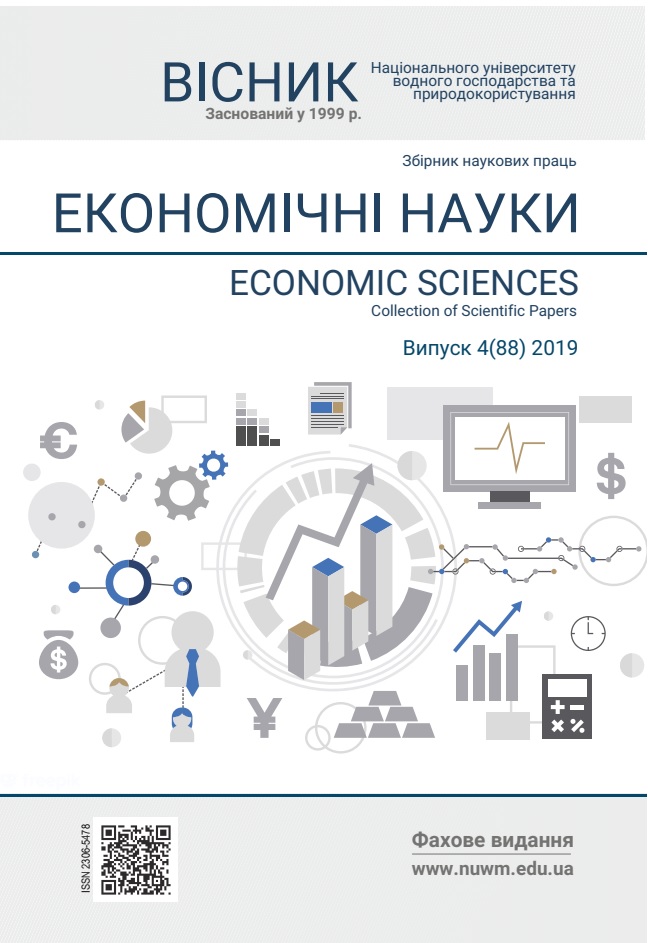CIRCULAR ECONOMY IN THE ECONOMIC SYSTEM OF UKRAINE: ITS STATE AND PROSPECTS
DOI:
https://doi.org/10.31713/ve4201920Keywords:
circular economy, green economy, resource decapling, environment, development.Abstract
The article summarizes the definitions of circular economy anddecapling, analyzes the role of green economy development in solvingurgent problems of depletion of non-renewable natural resources, theusing of environmentally hazardous resources and technologies inorder to reduce the risk for further economic, environmental andsocial development through the study of dynamics.Studies haveshown that the current situation regarding waste volumes in Ukraineis critical, as about 1.25% of the country's territory is occupied bylandfills. The main trends of waste management indicators in recentyears in Ukraine, which include in addition to the formation of theirdisposal, incineration and disposal in specially designated areas, areanalyzed.This led to the conclusion that at this stage of economicdevelopment there is an urgent need for decapiling, that is, in thetransition to an inclusive and circular economy. Decapling is theability of an economy to grow without a corresponding increase inenergy and resource use (source boundaries) and environmental load(absorption limits).Factors for the growth of GDP resourceproductivity and their relation to the policy of greening the economyfor Ukraine were also conducted. It is revealed that in Ukraine there isan irrational system of nature management and management of thesocio-economic development of the country, which is generallyinefficient and environmentally dangerous.Calculations indicate strengthening in some years negativemanifestations in the national economy and environmental field. Itbecomes obvious need for a balanced state policy aimed at ensuringbalanced development of Ukraine in its economic and environmentalcomponents. A number of measures have been proposed toimplement the circular economy strategy, including incentives forresource conservation, including fairer prices for natural resources,differentiated payment for waste disposal, changes in tax and publicprocurement policies to promote resource efficiency and ecoinnovation.References
Netherlands Green Plan URL: http://www.rri.org/green-plansnetherlands.php. (дата звернення: 15.01.2020).
Державна служба статистики України. URL: http://www.ukrstat.gov.ua/img/ua/title.gif. (дата звернення: 15.01.2020).
Статистическая служба Европейского союза. URL: https://ru.nencom.com/spravochnik/organizacii/eurostat. (дата звернення: 15.01.2020).
Сталий розвиток та екологічна безпека суспільства: теорія, методологія, практика / В. М. Андерсон, Н. М. Андрєєва, О. М. Алимов та ін. ; за ред. д.е.н., проф. Є. В. Хлобистова. Сімферополь : ИТ «АРИАЛ», 2011. 589 с.
Nguyen H., Stuchtey M., Zils M. Remaking the industrial economy. McKinsey Quaterly, February 2014. URL: https://www.mckinsey.com/business–functions/ (дата звернення: 15.01.2020).
Williams P. T. Waste Treatment and Disposal. Chichester, John Wiley & Sons, 2005. 383 p.
Данилишин Б. Ефект декаплінгу як фактор взаємозв’язку між економічним зростанням і тиском на довкілля. Вісник НАН України. 2008. № 5. С. 12–18.
Міщенко В. С. Проблеми імплементації європейського законодавcтва у сфері поводження з відходами. Сотрудничесто для решения проблемы отходов : материалы 4-й международной конференции (31 января – 1 февраля 2007 г., г. Харьков, Украина). Харьков, 2007. С. 21–24.
Масікевич Ю. Г., Шестопалов О. В., Негадайло А. А Теорія систем в екології. Суми : Сумський державний університет, 2015. 330 с.
Михайленко В. Звалища – виклик сталому розвитку. Віче : журнал Верховної Ради. 2008. URL: http://www.viche.info/journal/1052/ (дата звернення: 10.11.2019).
Мусіна Л. А., Кваша Т. К. Дослідження впливу ресурсоефективності на економічний розвиток в країнах – лідерах «зеленої» модернізації. Проблеми економіки. № 4, 2014.
Декаплінг між використанням природних ресурсів і впливом на навколишнє середовище та економічним зростанням : звіт Міжнародної Ресурсної Панелі ЮНЕП. 2011 р.
REFERENCES:
Netherlands Green Plan URL: http://www.rri.org/green-plansnetherlands.php. (data zvernennia: 15.01.2020).
Derzhavna sluzhba statystyky Ukrainy. URL: http://www.ukrstat.gov.ua/img/ua/title.gif. (data zvernennia: 15.01.2020).
Statystycheskaia sluzhba Evropeiskoho soiuza. URL: https://ru.nencom.com/spravochnik/organizacii/eurostat. (data zvernennia: 15.01.2020).
Stalyi rozvytok ta ekolohichna bezpeka suspilstva: teoriia, metodolohiia, praktyka / V. M. Anderson, N. M. Andrieieva, O. M. Alymov ta in. ; za red. d.e.n., prof. Ye. V. Khlobystova. Simferopol : YT «ARYAL», 2011. 589 s.
Nguyen H., Stuchtey M., Zils M. Remaking the industrial economy. McKinsey Quaterly, February 2014. URL: https://www.mckinsey.com/business–functions/ (data zvernennia: 15.01.2020).
Williams P. T. Waste Treatment and Disposal. Chichester, John Wiley & Sons, 2005. 383 p.
Danylyshyn B. Efekt dekaplinhu yak faktor vzaiemozviazku mizh ekonomichnym zrostanniam i tyskom na dovkillia. Visnyk NAN Ukrainy. 2008. № 5. S. 12–18.
Mishchenko V. S. Problemy implementatsii yevropeiskoho zakonodavctva u sferi povodzhennia z vidkhodamy. Sotrudnіchesto dlia reshenіia problemу otkhodov : materіalу 4-i mezhdunarodnoi konferentsіі (31 yanvaria – 1 fevralia 2007 h., h. Kharkov, Ukrayna). Kharkov, 2007. S. 21–24.
Masikevych Yu. H., Shestopalov O. V., Nehadailo A. A Teoriia system v ekolohii. Sumy : Sumskyi derzhavnyi universytet, 2015. 330 s.
Mykhailenko V. Zvalyshcha – vyklyk stalomu rozvytku. Viche : zhurnal Verkhovnoi Rady. 2008. URL: http://www.viche.info/journal/1052/ (data zvernennia: 10.11.2019).
Musina L. A., Kvasha T. K. Doslidzhennia vplyvu resursoefektyvnosti na ekonomichnyi rozvytok v krainakh – liderakh «zelenoi» modernizatsii. Problemy ekonomiky. № 4, 2014.
Dekaplinh mizh vykorystanniam pryrodnykh resursiv i vplyvom na navkolyshnie seredovyshche ta ekonomichnym zrostanniam : zvit Mizhnarodnoi Resursnoi Paneli YuNEP. 2011 r.

